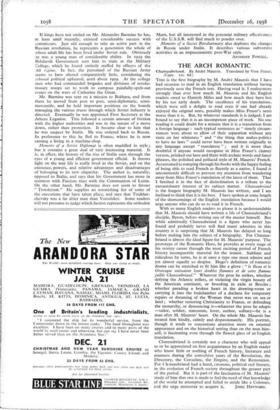THE ARCH ROMANTIC
Chateaubriand. By Andre Maurois. Translated by Vera Fraser. (Cape. I2S. 6d.)
Tins is the first biography by M. Andre Maurois that I have had occasion to read in an English translation without having previously seen the French text. Having read it, I realise more strongly than ever how much M. Maurois and his English readers owed to Hamish Miles and how much they have lost by his too early death. The excellence of his translations, which were still a delight to read even if one had already enjoyed the original texts, possibly makes Miss- Fraser's seem worse than it is. But, by whatever standards it is judged, I am bound to say that it is an incompetent piece of work. No one reading it could doubt for a minute that it is a translation from a foreign language : such typical sentences as "timely circum- stances were about to allow of their separation without any stain on her whiteness" and "the thing that makes politics to have no laws" could never have been written originally in any language except " translatese ; and it is more than doubtful if anyone would recognise in Miss Fraser's clumsy version, prinked out here and there with archaic words and fancy phrases, the polished and pellucid style of M. Maurois' French. Accustomed to romping through his books with the happy feeling of being able to read French as fluently as a native, I found it uncommonly difficult to prevent my attention from wandering away from Miss Fraser's translation of the latest of them. That I finished it in the face of disinclination is a tribute to the extraordinary interest of its subject 'matter. Chateaubriand is the longest biography M. Maurois has written, and I am inclined to think that it is his best. I have spoken at some length of the shortcomings of the English translation because I would urge anyone who can do so to read it in French.
With so many English readers to please it is understandable that M. Maurois should have written a life of Chateaubriand's disciple, Byron, before writing one of the master himself. But while admittedly Chateaubriand is a figure who never has found and probably never will find many admirers in this country it is surprising that M. Maurois has delayed so long before making him the subject of a biography. For Chateau- briand is almost the ideal figure for M. Maurois' purpose. The prototype of the Romantic Hero, he provides at every stage of his stormy career through the most exciting period of French history incomparable material for the ironist. Sublime and ridiculous by turns, he is at once a type one must admire and yet almost equally so despise. Hugo's definition of romantic drama can be stretched to fit him like a glove : "it Beau et It Grotesque unissaient leurs doubles flammes et de cette fiamme jail& Chateaubriand." Whatever the pose he strikes, whether defying the Atlantic rollers, or violating the virgin beauty of the American continent, or brooding in exile at Beccles ; whether parading a broken heart in the drawing-room or carrying it into the bedchamber of a duchess for temporary repairs or dreaming of the Woman that never was on sea or land ; whether restoring Christianity to France, or defending the monarchy, or denouncing it—whatever the pose he adopts —sailor, soldier, statesman, lover, author, solitary—he is a man after M. Maurois' heart. On the whole Mr. Maurois has treated him kindly, calmly and dispassionately. His portrait, though it tends to concentrate attention more on external appearance and on the historical setting than on the man him- self, is fascinating even through the flawed glass of an English translation.
Chateaubriand is certainly not a character who will appeal to or be appreciated on first acquaintance by an English reader who know link or nothing of French history, literature and manners during the convulsive years of the Revolution, the Directory, the Consulate, the Empire, and the Restoration. For Chateaubriand had a hand, cmorous, political and literary, in the evolution of French society throughout the greater part of the period. But it is part of the fascination cf M. Maurois' study of him that one is made to feel the need of that knowledge of the world he attempted and failed to stride like a Colossus, arid the urge moreover to acquire it. • JOHN, HAYWARD.














































 Previous page
Previous page